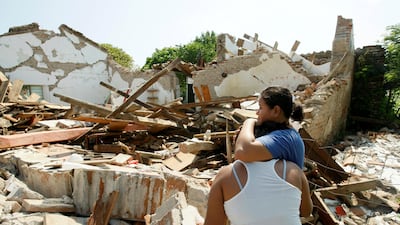The death toll from the massive earthquake that struck Mexico on Thursday night rose to at least 90 after emergency services in Oaxaca confirmed 71 confirmed fatalities in the state alone.
"It's 71. Just for Oaxaca," a spokesman for the state civil protection authority said.
At least 15 people died in the neighbouring state of Chiapas, local authorities said, while another four deaths were confirmed in the state of Tabasco to the north.
The 8.1 magnitude quake that struck off the coast of Chiapas was stronger than the devastating 1985 temblor that flattened swathes of Mexico City and killed thousands.
Most of the deaths in Oaxaca were in Juchitan, where some residents continued to sleep outside, fearful of more collapses as strong aftershocks continued to rattle the town, including a magnitude 5.2 jolt early on Sunday.
Local officials said they had counted nearly 800 aftershocks of all sizes since Thursday, and the US Geological Survey counted nearly 60 with a magnitude of 4.5 or greater.
Mexican president Enrique Pena Nieto said a third of Juchitan's homes had collapsed or were uninhabitable.
Teams of soldiers and federal police armed with shovels and sledgehammers fanned out across Juchitan to demolish damaged buildings and lorries began hauling away the many tonnes of rubble.
Maria de Lourdes Quintana Lopez said she could not wait for government assistance as she oversaw the demolition of her family's sweet business warehouse.
"We have to work so that we're not overcome with sadness," she said. "We're not going to wait for the government to do what it has to do."
On the outskirts of the city, the general hospital settled into its temporary home — a school gymnasium with gurneys parked on the basketball court. The earthquake had rendered the hospital uninhabitable, so the gym contained a mix of patients that predated the quake and those who suffered injuries as a result of it.
Staff at the single-storey hospital moved patients outside when earthquake struck and had transferred most of those who required specialised care to other facilities.
Selma Santiago Jimenez waved flies away from her husband and mopped his brow while he awaited transfer for surgery. He suffered injuries in a motorcycle accident before the earthquake. Windows broke and doors fell in the hospital, but staff quickly helped get her husband out, she said.
Mexico suffered another disaster when Hurricane Katia hit the east coast late on Friday. Two people died in a mudslide in the coastal state of Veracruz, where Katia made landfall as a Category 1 hurricane and was later downgraded to a tropical storm before petering out on Saturday.
Mr Pena Nieto said authorities were working to re-establish supplies of water and food and provide medical attention to those who needed it. He vowed the government would help rebuild.
At the local fairgrounds in Juchitan, about two dozen residents of a central neighbourhood gathered at the gates to a staging ground set up by the military.
They had come to complain that aid packages that the military started distributing on Saturday had not reached many families. An army captain pleaded for patience, but ultimately agreed to take two pickup trucks full of packages and water to their neighborhood.
It was not enough to satisfy all the residents who mobbed the pickups, but the captain promised soldiers would continue canvassing the city street by street.

